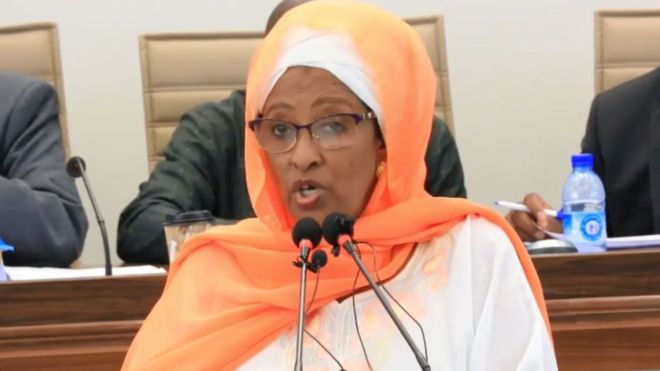NIEC SHOCKER: No elections in 2020 under current law, earliest March 2021

By T. Roble
The earliest Somalia can hold elections under the current law is March 2021, electoral body boss Halima Yarey has said throwing into spin any prospects of a vote this year and courts thoughts of a term extension for the current government.
Expected to announce the elections date and how the polls will be conducted, Yarey set out none of that and left parliament to decide whether the elections should be held in March or August 2021.
In no uncertain terms, the NIEC boss was categorical- as provided by the Elections Law, which contemplates use of technology only, the earliest elections can be held is August 2021. This is based on the assumption that biometric voter registration starts next week.
But Yarey who came to office in 2015 gave parliament a second option-manual voter registration which will take nine months from next month and culminate in a poll in March 2021.
Both options, it should be noted are way outside the Constitutional timeframes. The current parliament which was elected between October 2016 and January 2017 must fold before the same time this year. President Mohamed Farmaajo was elected February 8, 2017. He too will have been in office an extra one month should the NIEC have its way.
“We offer these two methods to choose from depending on the circumstances of the country,” Yarey said.
TERM EXTENSION OR 2016 MODEL
When Parliament announced the National Independent Electoral Commission (NIEC) chairperson would be appearing today after the same exercise was postponed for a month, there was expectation she would announce when the country will be going to the polls and the modalities.
The Elections Act sets out a one-person-one vote based on the First-Past-the Post or winner takes all option in future elections contrary to the Closed-List system under Proportional Representation earlier proposed by the NIEC.
To beat the deadlines as set out in the Constitution therefore, Somalia may have to revert to the 2016 model or a similar version. Under the 2016 Enhanced Legitimacy Model, 51 delegates were selected by clan elders to elect one MP translating to 14,025 delegates. This was an improved version from 2012 which left the role of selecting MPs to the 135 clan elders.
A possible option will be term extension of the current parliament and executive to meet the timelines set out by the electoral commission.